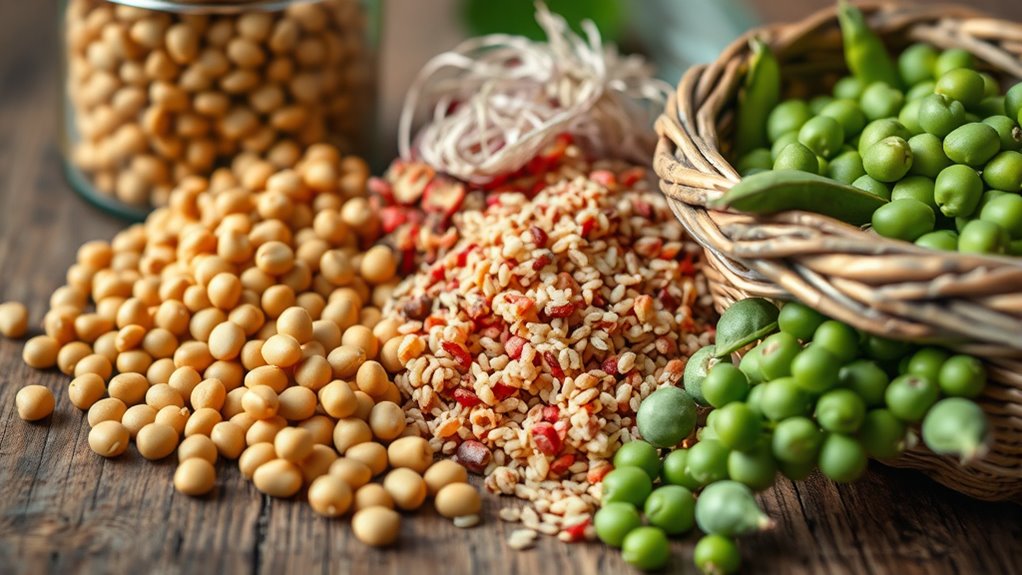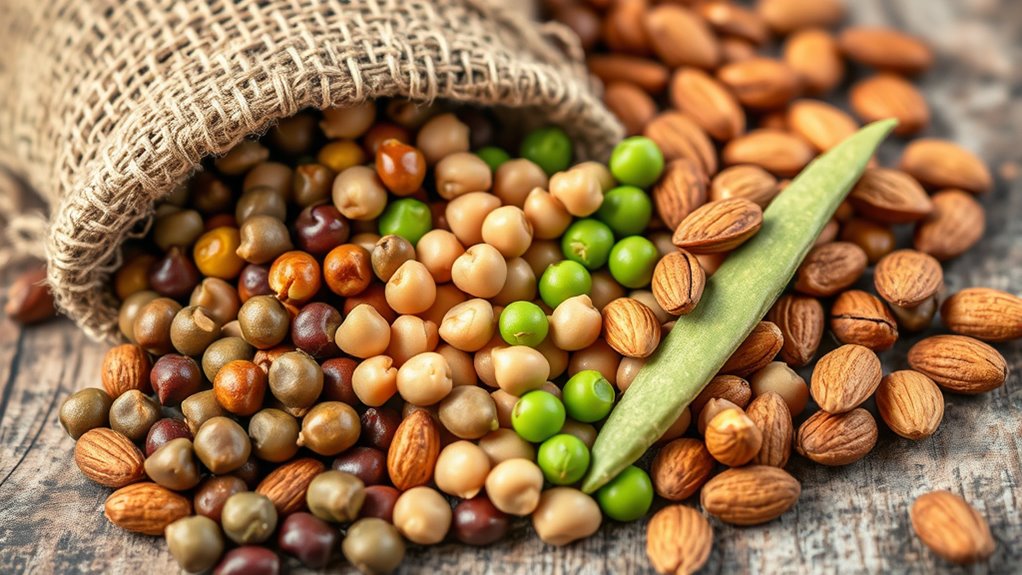Plant-based proteins like soy and various legumes can outperform whey by offering complete amino acids, fiber, and essential nutrients. Soy is especially versatile and rich in nutrients, supporting heart health and muscle building, while legumes such as lentils, chickpeas, and black beans provide affordability, long shelf life, and environmental benefits. These sources help meet your protein needs naturally and diversely. Keep exploring to discover more about how these plant proteins can elevate your diet and health goals.
Key Takeaways
- Soy provides complete plant protein with all essential amino acids, comparable or superior to whey for muscle building.
- Legumes like lentils, chickpeas, and black beans offer high protein, fiber, and nutrients, supporting health and performance.
- Plant proteins contain beneficial phytochemicals and fiber, which whey lacks, aiding in digestion and overall health.
- Many plant-based proteins are free from allergens and hormones common in dairy, making them safer alternatives.
- Diverse plant proteins can match or surpass whey in nutrient density, supporting fitness goals sustainably.

Are plant-based protein sources a good alternative to animal proteins? Absolutely, especially when you consider their numerous health benefits and versatility. Among these options, soy stands out as one of the most complete plant proteins, containing all essential amino acids your body needs. Soy benefits include not only its high protein content but also its ability to support heart health, thanks to its isoflavones that may help reduce cholesterol levels. Incorporating soy into your diet can be simple—think tofu, tempeh, soy milk, or edamame. These options are convenient and adaptable to various dishes, making plant-based eating more accessible.
Beyond soy, legume varieties form the backbone of many plant-based diets, offering an impressive range of options. Legumes are rich in protein, fiber, vitamins, and minerals, making them nutrient-dense and beneficial for overall health. Popular legume varieties include lentils, chickpeas, black beans, kidney beans, and mung beans. Each type brings its own unique texture and flavor, allowing you to diversify your meals easily. For example, lentils cook quickly and are perfect for soups and salads, while chickpeas work well in hummus or roasted as a snack. Black beans add richness to burritos and rice bowls, and mung beans are great in stir-fries or sprouted salads.
What makes legume varieties particularly appealing is their affordability and long shelf life, making them a practical choice for regular consumption. They also help you meet your protein needs without relying on animal products, which can be especially important if you’re looking to reduce your environmental footprint or follow a vegetarian or vegan lifestyle. Additionally, the fiber content in legumes promotes digestive health and helps maintain steady blood sugar levels, adding to their appeal as a healthful protein source.
When you compare plant-based proteins like soy and other legumes to whey, you’ll find that they not only match or surpass whey in certain nutritional aspects but also bring added benefits like fiber and phytochemicals that support your overall well-being. Plus, they’re free from common allergens and hormones sometimes found in dairy-based proteins. Incorporating a variety of legume varieties into your meals ensures you get a broad spectrum of nutrients and keeps your diet interesting. Whether you’re looking to build muscle, improve heart health, or simply eat more sustainably, plant-based proteins provide a powerful, versatile alternative to traditional animal proteins, with soy benefits and legume varieties leading the way.
Additionally, applying Design Thinking principles can help you experiment with new recipes and tailor your diet to best suit your personal preferences and health goals.
Frequently Asked Questions
Are Plant-Based Proteins Suitable for Muscle Building?
You might wonder if plant-based proteins are suitable for muscle building. The good news is that soy benefits, like being a complete protein, support muscle growth just as well as whey. Plus, you can choose from various flavors to suit your preferences, making plant proteins a versatile option. With consistent intake and combined with strength training, you can effectively build muscle using plant-based sources.
How Do Plant Proteins Compare in Amino Acid Profile?
Imagine building a sturdy bridge—each piece must fit perfectly. Plant proteins often lack amino acid completeness individually, like missing essential beams. But, by blending diverse plant sources, you create a strong, balanced structure. These plant protein blends guarantee you’re getting all essential amino acids, making them comparable or even superior to whey. So, with the right combination, plant proteins can support your muscle goals just as effectively.
Can Vegans Meet Daily Protein Requirements Easily?
You can meet your daily protein needs easily with thoughtful vegan meal planning. Focus on including a variety of plant-based sources like legumes, tofu, and quinoa to guarantee you’re getting all essential amino acids. While protein absorption rates may differ slightly from animal proteins, combining different plant proteins helps optimize bioavailability. Staying consistent and mindful of your intake makes it manageable to reach your daily goals without difficulty.
Are There Any Allergies Linked to Plant-Based Proteins?
Like Pandora’s box, concerns about plant-based proteins open up questions about allergies. You might wonder if soy allergies or gluten sensitivity pose risks. While most people tolerate these sources well, some do experience reactions. Always read labels carefully, and consult with a healthcare professional if you have known allergies. Staying informed helps you enjoy plant proteins safely, just as heroes navigate challenges with knowledge and caution.
What Is the Environmental Impact of Plant vs. Whey Proteins?
You might wonder about the environmental impact of plant versus whey proteins. Plant-based options generally offer greater sustainability benefits, as they require less land, water, and energy. Their ecological footprints are smaller, reducing greenhouse gas emissions and conserving resources. Choosing plant proteins can help you lower your environmental impact, making them a more eco-friendly choice compared to whey, which often has a higher ecological footprint due to dairy production.
Conclusion
You now see that plant-based proteins are more than just alternatives—they’re shining stars in the world of nutrition. With their impressive amino acid profiles and sustainable benefits, they outshine whey like a dawn outshines dusk. Embracing these sources isn’t just a trend; it’s a smart move for your health and the planet. So, consider planting your flag with these powerful, plant-based options and enjoy a future where wellness blossoms naturally.











